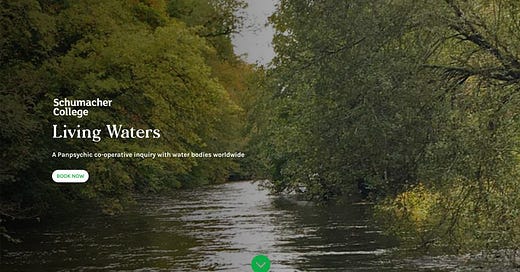An extra post this week to inform all our subscribers that the fourth Living Waters co-operative inquiry will be held from March 2024, on line, with international participation. This inquiry continues and builds on the work presented in Learning How Land Speaks
In the current time – called by many the Anthropocene – the underlying Western worldview is beginning to shift in profound ways. For the first time in centuries, the idea that we inhabit a profoundly silent and dead world of objects is truly challenged by perspectives that assert agency, life and meaning to animals, plants and even the Earth system – which James Lovelock originally called Gaia, and the eminent French sociologist Bruno Latour calls the living Earth as actor.
These views draw on a fast-growing body of evidence from biology (discovering sentience and experience in all life forms) and from Indigenous writers, historians and story tellers, who tell us that humans have, for most of their history, experienced the cosmos as suffused with life, animated with persons of all species with whom they could relate in order to keep the world alive.
This co-operative inquiry, in which all contribute both as co-reseasrchers and co-subjects, draws on revisions in philosophy, anthropology, ecology, education and social sciences – to offer pathways into experiences that connect us to a world which reveals itself as profoundly alive, sentient, and communicative. The inquiry takes us beyond mere thinking and teaching into active engagement with the world as sentient, as a two-way, subject-to-subject interaction.
The inquiry is based around the questions:
What would it be like to live in a world of sentient beings rather than inert objects? How would we relate to such a world? And if we invoke such a world of sentient presence, calling to other than human beings as persons, might we elicit a response?
All the information you need about this inquiry workshop can be found on the Dartington/Schumacher website. More on the underlying ideas and inquiry practice can be found throughout Learning How Land Speaks
The inquiry is online and designed for participation with Rivers and human participants across the globe. Please pass the information about this inquiry to others who might be interested.





This sounds very exciting! In 2017, following a devastating firestorm in Central Portugal, I responded to a spontaneous urge to research and write about the topic of 'Humus as a living organism'. I'm not a soil scientist, but my instinct told me that the soil herself had been 'cremated'.
After the 'big fire' all public recovery efforts seemed to focus on planting new trees and scattering seeds from airplanes over large areas of black denuded rocks.
Meanwhile the official definition of 'humus' offered by soil science was 'inert substance'.
Good to read and hear about projects dedicated to deepening our understanding of symbiogenesis. Thank you 🙏